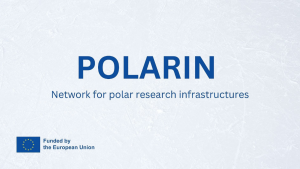 Today is the first day of POLARIN, a new EU project coordinated by the Alfred Wegener Institute, aiming to advance polar research infrastructure and facilitate interdisciplinary research in both the ArcticDefinitions of the Arctic vary according to environmental, geographical, political, cultural and scientific perspectives. Some scientists define the Arctic as areas having a high latitude, long winters, short, cool summers,... More and Antarctic regions. POLARIN will together with its 50 partners provide access to 64 leading polar research infrastructures worldwide.
Today is the first day of POLARIN, a new EU project coordinated by the Alfred Wegener Institute, aiming to advance polar research infrastructure and facilitate interdisciplinary research in both the ArcticDefinitions of the Arctic vary according to environmental, geographical, political, cultural and scientific perspectives. Some scientists define the Arctic as areas having a high latitude, long winters, short, cool summers,... More and Antarctic regions. POLARIN will together with its 50 partners provide access to 64 leading polar research infrastructures worldwide.
There is a critical need for comprehensive understanding and prediction of the complex processes shaping the polar regions, essential for climateThe average weather we would expect over a long period of time (seasons, years, decades). Climate varies from place-to-place across the Earth. Climate is determined by long-term (over at least... More research and global climate changeAccording to the United Nations Framework Convention on Climate Change, climate change is change in the climate of the whole Earth or a region of the Earth that is believed... More mitigation strategies.
INPA (INTERACT Non-Profit Association) is playing a significant part in the project: POLARIN will provide international access to 64 leading polar research infrastructures, including their ArcticDefinitions of the Arctic vary according to environmental, geographical, political, cultural and scientific perspectives. Some scientists define the Arctic as areas having a high latitude, long winters, short, cool summers,... More and Antarctic research stations, research vessels and icebreakers at both poles, observatories (on land and at sea), data infrastructures, and repositories for ice and sediment cores. Both physical and virtual access will be granted along with remote access (researchers will be able to request samples, datasets and other resources, which will then be gathered / prepared at the respective infrastructure without any need for the requester to be on site).
